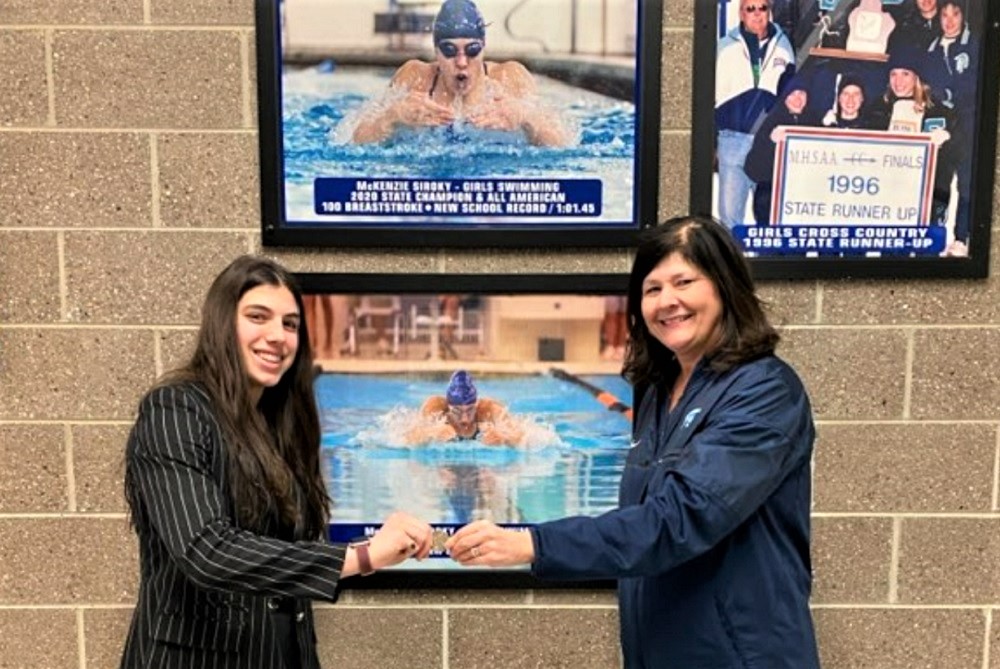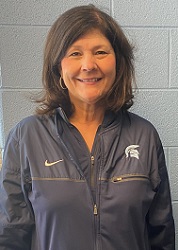
Thank Roosevelt for Football Weekends
December 20, 2013
By Rob Kaminski
MHSAA benchmarks editor
The next time you find yourself immersed in a tense crosstown football rivalry on a Friday night followed by a Saturday pilgrimage to the nearest college campus and a Sunday afternoon with a remote and your favorite snacks and beverages, take a moment to consider what the weekend would be like if it weren’t for Teddy Roosevelt.
The man who became our 26th President shortly after the turn of the 20th Century following the assassination of William McKinley in 1901 was a football fan like you. Maybe more so.
Today’s game of football has reached a critical crossroads. Player size and speed have increased across the board. Savage use of equipment as weapons rather than protective gear has been glorified on television networks and social media. Leaders of the game at all levels have recognized the need for change, employing new rules and widespread educational efforts to aid in preserving the sport.
History, as they say, is repeating itself.
In an ironic twist, it was Roosevelt who saved the then-brutally violent game of football from itself more than 100 years ago. Yes, the same “Rough and Ready Teddy” who led the charge up San Juan Hill during the Spanish-American War and often sparred in the boxing ring while in office from 1901-09 opined that football was becoming so gruesome that he delivered an ultimatum: clean up the game or it would be outlawed.
The Chicago Tribune reported that in 1904 alone, there were 18 football deaths and 159 serious injuries, mostly among prep school players. Football deaths suffered by younger players were reported on a nearly weekly basis, as outraged citizens called on colleges and high schools to banish football outright.
In stepped Roosevelt, who called head coaches and representatives from Harvard, Yale and Princeton – college powers at the time – to the White House in 1905 urging them to eliminate excessive violence and set an example of fair play for the rest of the country. When the casualties actually rose by one during the ensuing season, Roosevelt reacted with greater resolve and convened leading football authorities for the purpose of authoring drastic rules changes. What emerged was an intercollegiate conference which was the predecessor of the NCAA.
Among the most effective changes for the 1906 season were the legalization of the forward pass, the elimination of mass formations, and the creation of a neutral zone. Football fatalities fell to 11 in each of the next two seasons, and severe injuries fell drastically.
Thanks to the introduction of protective equipment and ever-evolving rules changes, football during the 100-plus years to follow has become an exponentially safer game. Yet, the game’s leaders always will need to adjust and react to scrutiny that comes with the territory.
So, as the game once again undergoes rules modifications in the name of safety, give a tip of the cap to President Roosevelt while you enjoy college bowl season and the NFL playoffs and begin to think ahead to the first high school practice of 2014.

2022 WISL Honoree Hyman Lauded for Lifetime of Leadership
By
Geoff Kimmerly
MHSAA.com senior editor
February 25, 2022
Lori Hyman was a sports standout in high school, then at Michigan State University. She then coached college basketball for 17 years, starting when she was only 23 years old, and surely could’ve continued down that path.
While always a leader, she decided to change gears in 1995 and provide guidance another way – coaching up coaches as a high school athletic director. Over the next 27 years, she became one of the most respected ADs in Michigan – and contributed in that role at her alma mater Livonia Stevenson over the last 22.
To celebrate her many contributions to school sports, at home but also statewide, Hyman has been named the 35th recipient of the MHSAA Women In Sports Leadership Award. She will receive the award during the Division 1 Girls Basketball Final on March 19 at Michigan State’s Breslin Center.
Hyman served her first five years as an athletic director at Dexter, making the move there after four college basketball coaching stops. After a memorable hoops career at MSU, she served as a women’s basketball graduate assistant at Ferris State University and then head coach at Northwood Institute (now University) from 1981-82 – when she was only 23 years old – through 1985-86.
She then served as an assistant at University of Illinois before returning as head coach at Ferris State from 1989-90 through 1994-95. In Fall 1995, she began at Dexter.
“Every part of my career I’ve been happy with, and honored, and just thoroughly enjoyed it,” Hyman said. “It’s been a passion of mine, every aspect.
“(Playing at Michigan State) was one of the best times, if not the best time, of my life as a youngster. And then being an athletic director has probably been the most rewarding as an adult. And being at Stevenson, coming back home, has been quite an honor and just a very rich experience for me.”
Each year, the Representative Council considers the achievements of women coaches, officials and athletic administrators affiliated with the MHSAA who show exemplary leadership capabilities and positive contributions to athletics.
 Hyman is a 1975 graduate of Stevenson, where she also played softball and competed in track & field. She was named MSU’s Outstanding Athlete of the Year for women’s basketball in 1979, after serving as co-captain of the team that season but missing the majority of it with an injury.
Hyman is a 1975 graduate of Stevenson, where she also played softball and competed in track & field. She was named MSU’s Outstanding Athlete of the Year for women’s basketball in 1979, after serving as co-captain of the team that season but missing the majority of it with an injury.
As an athlete at MSU, she joined her teammates in filing a 1978 discrimination complaint that requested the women’s basketball team receive travel allowances equal to those received by the Spartans men’s team. “It is very meaningful that Michigan State is where they are now, not just in women’s basketball but the women’s sport program,” Hyman said. “I feel like we were part of that growing and moving forward in a positive way, and I thank Michigan State for recognizing that and moving it forward.”
She graduated with a bachelor’s degree in physical education and health in 1980 and has a master’s in athletic administration from Wayne State University. She received her certified master athletic administrator designation from the National Interscholastic Athletic Administrators Association (NIAAA) in 2006.
Back at Stevenson, Hyman has directed the athletic program for a high school with nearly 1,700 students, which by enrollment ranks 50th out of 750 MHSAA member schools.
She has hosted a multitude of MHSAA Tournament events while at both Dexter and Stevenson and has served on the MHSAA’s girls tennis, girls basketball and boys basketball committees. She also has served as the girls and boys tennis commissioner of the Kensington Lakes Activities Association, of which Stevenson is a member.
“Lori has been a leader and pioneer in the world of athletics, and in particular as an advocate for females and girls sports,” MHSAA Executive Director Mark Uyl said. “When she left coaching basketball to work as an AD, it was an incredible victory for kids in our state. She’s been dependable, loyal and just a model of consistency in running a first-class program.”
Hyman was named her region’s Athletic Director of the Year by the Michigan Interscholastic Athletic Administrators Association (MIAAA) in 2014 and received its Jack Johnson Distinguished Service Award in 2015.
As an instructor for the MIAAA, Hyman has provided training particularly to beginning athletic directors. She has served as a Leadership Training Institute instructor as well for the MIAAA and as a presider and speaker at the MIAAA’s annual conference. She also has spoken at the MHSAA’s Women In Sports Leadership Conference.
“I’ve always been an advocate for women in sports and equal opportunity,” Hyman added. “I treat all of the sports here equally, male and female. But if I feel that there needs to be a little bit more advocacy for women in sports, whether it’s coaching and getting more girls involved, or officiating, administration, any kind of leadership, I’m really big on that.”
“I’m a big advocate for women in athletics, but (also) just athletics in general.”
In addition to her vast school sports responsibilities and contributions, Hyman has volunteered with Special Olympics, Livonia’s Newburg United Methodist Church and Rotary Club.
The first Women In Sports Leadership Award was presented in 1990.
Past recipients
1990 – Carol Seavoy, L’Anse
1991 – Diane Laffey, Harper Woods
1992 – Patricia Ashby, Scotts
1993 – Jo Lake, Grosse Pointe
1994 – Brenda Gatlin, Detroit
1995 – Jane Bennett, Ann Arbor
1996 – Cheryl Amos-Helmicki, Huntington Woods
1997 – Delores L. Elswick, Detroit
1998 – Karen S. Leinaar, Delton
1999 – Kathy McGee, Flint
2000 – Pat Richardson, Grass Lake
2001 – Suzanne Martin, East Lansing
2002 – Susan Barthold, Kentwood
2003 – Nancy Clark, Flint
2004 – Kathy Vruggink Westdorp, Grand Rapids
2005 – Barbara Redding, Capac
2006 – Melanie Miller, Lansing
2007 – Jan Sander, Warren Woods
2008 – Jane Bos, Grand Rapids
2009 – Gail Ganakas, Flint; Deb VanKuiken, Holly
2010 – Gina Mazzolini, Lansing
2011 – Ellen Pugh, West Branch; Patti Tibaldi, Traverse City
2012 – Janet Gillette, Comstock Park
2013 – Barbara Beckett, Traverse City
2014 – Teri Reyburn, DeWitt
2015 – Jean LaClair, Bronson
2016 – Betty Wroubel, Pontiac
2017 – Dottie Davis, Ann Arbor
2018 – Meg Seng, Ann Arbor
2019 – Kris Isom, Adrian
2020 – Nikki Norris, East Lansing
2021 – Dorene Ingalls, St. Ignace
PHOTO Livonia Stevenson athletic director Lori Hyman (right) and Finals swimming champion McKenzie Siroky hold up a championship medal alongside photos honoring Siroky's achievements. (Photo courtesy of the Stevenson athletic department.)

